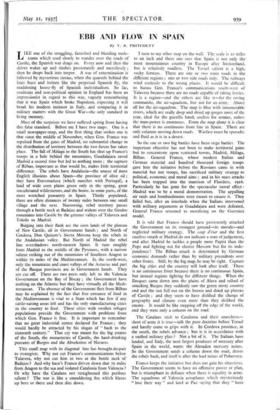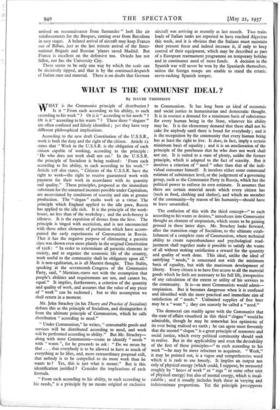EBB AND FLOW IN SPAIN
By V. S. PRITCHETT
TIKE one of the straggling, famished and bleeding mule- ' A teams which used slowly to wander over the roads of Castile, the Spanish war drags on. Every now and then the driver wakes up and slashes passionately and mercilessly ; then he- drops back into torpor. A war of extermination is followed by mysterious siestas, when the quarrels behind the lines buzz and irritate like the perpetual Spanish fly, the maddening house-fly of Spanish individualism. So far, moderate and non-political opinion in England has been an impressionist in regard to this war, vaguely remembering that it was Spain which broke Napoleon, expecting it will break his modern imitator in Italy; and comparing it in military matters with the Great War—the only standard in living memory.
Most of the surprises we have suffered spring from having this false standard. Before me I have two maps. One is a small newspaper-map, and the first thing that strikes one is that since the middle of November, when Gen. Franco was repulsed from the gates of Madrid, no substantial change in the distribution of territory between the two forces has taken place. The fall of Malaga in the South has shut up Franco's troops in a hole behind the mountains, Guadalajara saved Madrid a second time but led to nothing more ; the capture of Bilbao, important as that would be, makes little territorial difference. The rebels have Andalusia—the source of most English illusions about Spain—the province of olive oil ; they have Extremadura (which marches with Portugal), a land of wide corn plains green only in the spring, great uncultivated wildernesses, and the home, in some parts, of the most wretched peasantry in Spain. Thinly populated, there are often distances of twenty miles between one small village and the next. Narrowing, rebel territory passes through a bottle neck at Badajoz and widens over the Gredos mountains into Castile by the greener valleys of Talavera and Toledo to Madrid.
Bulging into their flank are the corn lands of the plateau of New Castile, all in Government hands ; and North of Cordova, Don Quixote's Sierra Morena keep the rebels in the Andalusian valley. But North of Madrid the rebel line overshadows north-eastern Spain. It runs roughly from Madrid to the middle of the Pyrenees, with a narrow salient striking out of the mountains of Southern Aragon to within 70 miles of the Mediterranean. In the north-west, only the mountains and coast valleys of the Asturias and part of the Basque provinces are in Government hands. They are cut off. There are two ports only left to the Valencia Government on the Bay of Biscay ; the Government have nothing on the Atlantic but they have virtually all the Medi- terranean. The absence of the Government fleet from Bilbao may be explained by the fact that free entrance of food in the Mediterranean is vital to a State which has few if any cattle-raising areas left and has the only manufacturing cities in the country to feed. These cities with swollen refugee populations provide the Government with problems from which Gen. Franco is free. It is important to remember that no great industrial centre declared for Franco ; they would hardly be attracted by his slogan of " back to the sixteenth century." That cry was meant for the big estates of the South, the monasteries of Castile, the hard-drinking peasants of Burgos and the Absolutists of Navarre.
This small map with its diagonal line has brought despair to strategistS. Why not cut Franco's communications below Talavera, why not cut him in two at the bottle neck of Badajoz ? And why hasn't Franco driven down that 70 miles from Aragon to the sea and isolated Catalonia from Valencia ? Or why have the Catalans not straightened this perilous salient ? The war is like a smouldering fire which blazes up here or there and then dies down. I turn to my other map on the wall. The scale is to miles to an inch and there one sees that Spain is not only the most mountainous country in Europe after Switzerland, but is relatively roadless. The Teruel salient is a high, rocky fortress. There are one or two main roads in the different regions ; one or two side roads only. The railways wind uselessly to the wrong places. It would be difficult to harass Gen. Franco's communications south-west of Talavera because there are no roads capable of taking lorries. It is a region—and the others are like it—for the roving commando, the air-squadron, but not for an army. Above all for the air-squadron. The map is blue with innumerable rivers, which are really deep and dried up gorges most of the year, ideal for the guerilla band, useless for armies, unless the man-power is enormous. From the map alone it is clear that there is no continuous front line in Spain. There are only columns moving down roads. Warfare must be sporadic and fluid as it is in a desert.
So the one or two big battles have been siege battles. The important objective has not been to make territorial gains but to concentrate upon scattered towns, Madrid, Malaga, Bilbao. General Franco, whose modern Italian and German material and hundred thousand foreign troops gave him the initiative before the Russians came in with material but not troops, has sacrificed military strategy to political, economic and moral aims ; and in his mass attacks has been trapped into the inanition of Flanders, 1916. Particularly he has gone for the spectacular moral effect : Madrid was to be a moral demonstration. The appalling air raids and bombardments were meant to ensure it. They failed but, after an interlude when the Italians intervened with military arguments at Guadalajara and were defeated, General Franco returned to moralising on the Guernica model.
It is odd that Franco should have persistently attacked the Government on its strongest ground—its morale—and neglected military strategy. The coup d'etat and the first careless smash at Madrid do not indicate a man of judgement, and after Madrid he tackles a people more Papist than the Pope and fighting not for elusive Moscow but for its inde- pendence ! The Bilbao attack is determined by German economic demands rather than by military precedents over other fronts. Still, by the big map, he may be right. Capture the big cities and the country will look after itself. There is no continuous front because there is no continuous Spain, but instead regions fighting for different things. When the Basques came down into the plains of Alava and talked of attacking Burgos they suddenly saw the green misty country end and the sun full out on the brown and dried up plateau of Castile ; and they seem to have disliked the change of geography and climate even more than they disliked the enemy. It would be like stepping off the edge of the world, and they were only a column on the road.
The Catalans stick to Catalonia and their anarchists— short of arms it is true—talk the pure doctrine before Teruel and hardly come to grips with it. In Cordova province, in the south, the rebels advance ; but is it in accordance with a unified military plan ? Not a bit of it. The Italians have landed, and Italy, the next largest producer of mercury after Spain in the world, wants the Almaden mercury mines. So the Government sends a column down the road, drives the rebels back, and itself is after the lead mines of Pefiarroya.
Franco keeps the initiative but does not gain his objectives. The Government seems to have no offensive power or plan, but is triumphant in defence when there is equality in arms. The squadrons of Valencia aeroplanes which mysteriously " lose their way " and land at Pau saying that they " have arrived on reconnaissance from Santander " look like air reinforcements for the Basques, coming over from Barcelona in easy stages. A belated arrival of aircraft may keep Franco out of Bilbao, just as the last minute arrival of the Inter- national Brigade and Russian 'planes saved Madrid. But Franco is excellent on the defensive too. Oviedo has not fallen, nor has the University City.
There seems to be only one way by which the scale can be decisively tipped, and that is by the continued despatch of Italian men and material. There is no doubt that German aircraft was arriving as recently as last month. Two train- loads of Italian tanks are reported to have reached Algeciras this week, and it is obvious that the Italians must maintain their present force and indeed increase it, if only to keep control of their equipment, which may be described as part of a European rearmament programme on temporary holiday and in continuous need of more funds. A decision in the Spanish war will never be won by the Spaniards themselves, unless the foreign troops arc unable to stand the erratic, nerve-racking Spanish temper.















































 Previous page
Previous page